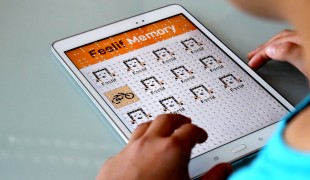- 9977
- 554
- 23
- 13
- 0
- Help Ukraine
About the solution
Ghotit Dyslexia Keyboard uses advanced writing and reading assistive technologies tailor-made for people with dyslexia, dysgraphia, and other learning disabilities.
"Mobile revolution has affected the way people consume information and communicate. More and more people are adopting mobile devises as the preferable means to communicate with each other. This is influencing the writing assistant tools developed for dyslexics. With Dyslexia Keyboard, people with dyslexia will be able to read, write and freely", the inventor explained.
Ofer founded his company in 2007, and his keyboard is already patented.
The solution provides a patent-protected context spell checking technology tuned for people with dyslexia and bad spelling habits. Using these algorithms, the software can detect and correct not only really bad spelled words but also misused words, words that are spelled correctly but are written out of context.
"Ghotit also offers advanced grammar checking algorithms ensuring that the corrected text is not only error-free but also written with correct English grammar", said Ofer.
The CEO was driven to create this product due to a particular situation, since most software at the time handle spell check, but can miss things like a correctly spelled word that is wrong for the context.
Ofer experienced this himself after a meeting with a prominent VP at a British Telecom. They had a great meeting and Mr. Chermesh left feeling good, having really enjoyed his time with the VP. The next day he crafted an email to the VP to thank him and tell him how much he enjoyed the meeting. Word corrected the mistakes in his email. Unfortunately, it didn’t catch that Ofer had typed, “I really enjoyed our mating”.
More info: http://www.ghotit.com/
Adapted from: http://bit.ly/2kUtoLz
This solution shall not include mention to the use of drugs, chemicals or biologicals (including food); invasive devices; offensive, commercial or inherently dangerous content. This solution was not medically validated. Proceed with caution! If you have any doubts, please consult with a health professional.
DISCLAIMER: This story was written by someone who is not the author of the solution, therefore please be advised that, although it was written with the utmost respect for the innovation and the innovator, there can be some incorrect statements. If you find any errors please contact the patient Innovation team via info@patient-innovation.com
-
-
345
-
0
-
3570

Dyslexic man invents app to cope with this condition
COMMUNICATION: Communicating, whether by speaking, listening, or other means
Reading
dyslexia
Neuromuscular Disorders
Educational/Leisure device (book, toy, game...)
App (Including when connected with wearable)
Muscle weakness
Difficulty speaking or understanding speech
Confusion
Anxiety
Mood swings
Depression or anxiety
Managing Neurological Disorders
Enhancing Mental Health
Improving Speech and Communication
Neurology
Psychiatry
United Kingdom
-
-
-
813
-
2
-
13332

Feelif is a multimedia device for blind and visually impaired people
COMMUNICATION: Communicating, whether by speaking, listening, or other means
Reading
Video gaming
Blindness
Visual Impairment
Congenital Deafness
Hearing Disorders
App (Including when connected with wearable)
Videogame
Educational/Leisure device (book, toy, game...)
Vision problems
Hearing loss or ringing in the ears (tinnitus)
Managing Neurological Disorders
Improving Speech and Communication
General and Family Medicine
Medical Genetics
Neurology
Ophthalmology
Otorhinolaryngology
Pediatrics
Slovenia
-
-
-
406
-
0
-
4647

Blind student invents a new way of teaching and learning math
COMMUNICATION: Communicating, whether by speaking, listening, or other means
Studying
Reading
Blindness
5 Senses support devices: (glasses, hearing aids, headphones...)
App (Including when connected with wearable)
Recovering cognitive function
Promoting self-management
Managing Neurological Disorders
Improving Speech and Communication
Neurology
Ophthalmology
United States
-
 en
en